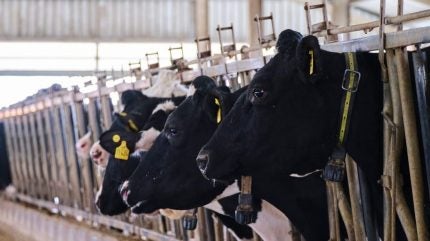
Six of the world’s largest food companies have launched the Dairy Methane Alliance at COP28 with a pledge to disclose annual emissions.
Nestlé, Danone, General Mills, Kraft Heinz, Bel Group and Lactalis are signatories to the pact. It was announced on stage in Dubai today (5 December) at an event attended by company representatives and Fred Krupp, the president of the non-profit group, the Environmental Defense Fund (EDF).

Discover B2B Marketing That Performs
Combine business intelligence and editorial excellence to reach engaged professionals across 36 leading media platforms.
The food manufacturers have committed to disclose annual emissions from their dairy supply chains and “create and implement a comprehensive methane action plan”, according to a statement from EDF.
The commitment was welcomed in campaign circles but some expressed disappointment at the absence from the pledge of other major dairy companies, including Arla Foods.
Antonia Wanner, the global head of ESG operations and deployment at Nestlé, said: “By joining DMAA, we hope to encourage broader industry cooperation on this important agenda, sharing our insights and learning from others as we make progress towards our goals.
“Nestlé’s net-zero roadmap tackles all types of greenhouse gas emissions, including methane. We are working with farmers and our suppliers to find practical and affordable ways to take action now.”

US Tariffs are shifting - will you react or anticipate?
Don’t let policy changes catch you off guard. Stay proactive with real-time data and expert analysis.
By GlobalDataHenri Bruxelles, Danone’s chief sustainability and strategic business development officer, added: “We are convinced that we can deliver on this ambition by working with other dairy players and partners to set the bar high, develop tools and scale best practices.
“We are thrilled to be a co-founding member of this Alliance, which is a powerful signal of how the dairy sector can collectively tackle the challenge of climate change while strengthening livelihoods and resilience, and providing nutritious food.”
In January, Danone said it was working toward cutting absolute methane emissions from its fresh milk by 30% by 2030, compared to a 2020 baseline.
According to EDF, agriculture is “responsible for nearly 40% of human-caused methane emissions, the majority of which comes from livestock”.
The non-profit added: “Collective action on methane today will avoid the worst impacts of climate change, and we’ll see the difference in our lifetimes. These corporations have stepped forward to set a new standard for accountability, transparency, and ambitious climate action within the food industry.”
Nuša Urbancic, the CEO of Netherlands-based NGO the Changing Markets Foundation, gave a hedged response to the announcement. “The commitment by dairy companies to report on their methane emissions is a step in the right direction. This must be quickly followed with clear targets for methane reductions and a plan to deliver on them if it is to have an impact,” she said. “Today’s big disappointment is the absence of dairy giants like Arla, Fonterra and Dairy Farmers of America which are opting out of action on their main source of emissions.”
EDF called on other international dairy companies across the supply chain to join the initiative to “expedite a global shift to climate-smart dairy and deliver larger impact and scale”.
Its president Kruff said: “Transforming how we produce food is essential to stabilising the climate. We also need to support farmers as they work to feed the world in the face of climate change.
“Dairy companies can be part of the fight against climate change by reducing methane pollution.”
EDF hopes DMAA will serve as a “novel model for transparency, accountability, and collaboration to reduce critical emissions within a global industry”, and will offer assistance in technical support and best practices.
The sustainability non-profit organisation Ceres will assist in that endeavour, along with the “development of a methane action plan template that aligns with investor and corporate expectations, as well as helping to ensure companies are making progress against key plan milestones”.
Meryl Richards, programme director for food and forests at Ceres said in the joint statement from all the DMAA participants: “Given the agricultural sector’s huge contribution to the climate crisis, we are pleased to partner with the Dairy Methane Action Alliance and encourage companies to take needed action on reducing a major source of their emissions by adopting and advancing practices toward a more sustainable food system and low carbon economy.”
David Shaw, the international director of ESG at Kraft Heinz, added: “Some of our most beloved brands are cheese brands, emphasising that responsibility, as we aim for net-zero emissions by 2050.
“We anticipate the progress that we’ll be able to make alongside Environmental Defense Fund and other leading companies to mitigate the climate impacts while preserving the legacy of our brands for generations to come.”
On Saturday, global leaders unveiled a raft of new announcements at COP28 targeting methane, moves cautiously welcomed by campaigners who nonetheless want further government action to tackle emissions from livestock.
During a summit on methane and non-CO2 greenhouse gases, COP28 host the United Arab Emirates (UAE) called on parties to the Paris Agreement to submit national climate targets (nationally determined contributions, or NDCs), for 2035 that are economy-wide and cover all greenhouse gases, not just CO2 – echoing a recent commitment made by the US and China under a new bilateral climate deal.
Meanwhile, national governments, philanthropies and the private sector together announced more than $1bn in new grant funding for methane reduction. The funding is to support the so-called Methane Finance Sprint, which is due to be administered by a handful of entities including the World Bank and the Global Methane Hub.
The funding for the Global Methane Hub was formally unveiled at COP28. More than $200m is being put forward, including from Danone, which announced its contribution last month.





